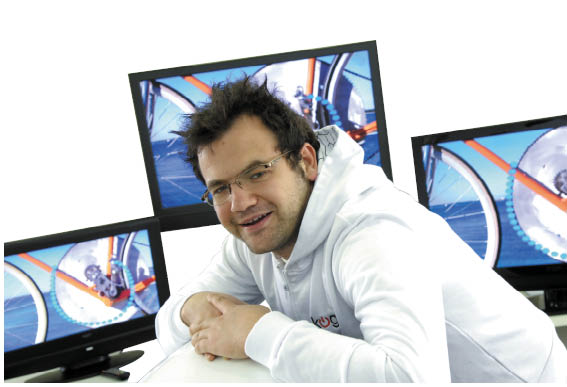The online empire of Ruslan Kogan

Self-confessed ‘gadget man’ and recent IT graduate Ruslan Kogan was in the market for an LCD TV.
He had money put aside and was earning a decent wage, but the high prices astonished him.
ADVERTISEMENT
“I really wanted one but couldn’t afford it, so I began contacting factories in China,” Ruslan says.
“I soon realised that I could import an LCD TV for much less than they were selling for in Australia.
“There was a huge gap in the market. I could be selling a TV in Australia for $1,000 that others advertised for $2,000 to $3,000.”
Against the advice of family and friends Ruslan quit his job – his first after graduating from university – and started Kogan Technologies, which imports its own brand of TVs and other electronic equipment.
Products are assembled in China with components from different manufacturers, shipped to Australia and sold online.
“The main component of an LCD TV is the panel. There are only a few big manufacturers of LCD panels – Samsung, Sharp, Hitachi and Philips/LG. Of the thousands of different manufacturers of LCDs in the market the panel is made by one of those players.
“So, we go to China and decide on the best value TV in a particular size. If we are looking at a 26” we’ll evaluate a panel from each manufacturer and pick the best one based on picture quality and price.
“There are also only a few manufacturers that make tuners and power boards. Once we make our selection we mass produce and sell at unbeatable prices.”
The 26-year-old says his business cuts out the middle men and acts as manufacturer, importer, wholesaler and retailer. Reduced overheads mean the goods sell for hundred of dollars less than other products.
What’s more, Kogan’s products often become available before those manufactured by large companies.
“This business model often means we are first to market. For example, we were the first company in Australia to have a 46” LCD TV.
“We used the Samsung panel, but we managed to launch the screen before Samsung. The sheer size of that company gives it a ‘time to market’ of close to a year. For similar reasons we had the first digital photo frames on the market in Australia.”
Ruslan says large manufacturers must reach break-even before they are able to reduce prices, whereas Kogan can offer low prices from the beginning.
“When Sony and Samsung developed Blu-ray technology they obviously wanted to get paid off first, so they released a range of players for $1,000.
“Early adopters bought the players for that amount, and these companies were able to recoup some of the research and development costs before making the technology available to the open market.”
Ruslan says Internet-only companies like Kogan offer superior customer service.
“We can’t afford to have an upset customer, because all it takes to have a direct effect on our business is a negative review on our website or any technology blog.
“Customers can see on our website exactly what the last 10,000 customers thought of their purchase.”
Asked if he would ever explore retail opportunities, Ruslan dismisses the idea.
“Offering my products in a shop would be taking a few steps backwards – it would be cannibalising our business model to do so.
“The reason we can offer such low prices, excellent service and convenience is that we are an online business with limited overheads.
“Everything runs very efficiently and everything is automated. All customers get a PDF invoice after they interact with Kogan, and we can locate any transaction within seconds.
“We have customers who make purchases before 9am and receive their goods by noon the same day.”
Ruslan believes a retail chain would increase prices, because of the need to incorporate additional costs such as store rent, lighting, stock loss and delivery.
Contrary to trends in other industries, he believes the economic downturn will result in increased sales of his products, particularly LCD TVs.
“More TVs are being sold now than on this day two years ago when everything was flourishing, so there is no shortage of demand. People are spending more time at home, and a TV is a critical part of their home entertainment set-up.
“Consumers are also getting smarter. They are comparing reviews and specs to ensure they get the right product, rather than simply slapping down their credit card and saying ‘I’ll take that one’.”
Ruslan says the company is looking to capture a greater share of the home automation market.
“We have a personal video recorder coming out that has wireless connectivity – it can stream videos from any computer in a house and play audio through a surround system in a similar fashion.”
And for those looking to adopt a similar business model, he is open to the challenge.
“Competition in the market is what I love. I began my business with zero start-up capital, so for anyone who wants to try, my advice is ‘go for it’. I look forward to competing with you.”
-
ADVERTISEMENT
-
ADVERTISEMENT

